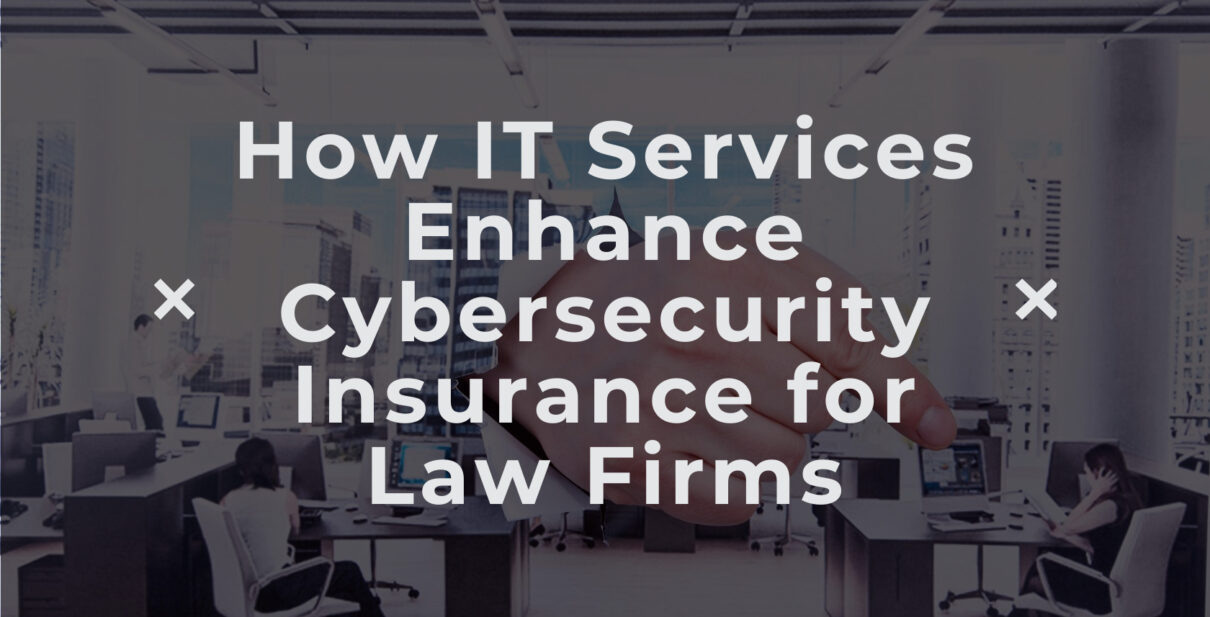Cybersecurity threats are a significant concern for law firms, which handle vast amounts of sensitive and confidential information. These threats can lead to data breaches, financial loss, and damage to a firm’s reputation. To mitigate these risks, law firms are increasingly turning to cybersecurity insurance. However, simply having insurance is not enough. Law firm IT services play a crucial role in enhancing cybersecurity measures, thereby optimising the benefits of cybersecurity insurance.
Understanding Cybersecurity Insurance
Cybersecurity insurance, also known as cyber liability insurance, is designed to protect businesses against losses resulting from cyberattacks and data breaches. This insurance typically covers costs related to data recovery, legal fees, notification expenses, and even business interruption. For law firms, having this type of insurance is essential due to the sensitive nature of the information they manage.
The Role of Law Firm IT Services
Law firm IT services are specialised solutions tailored to the unique needs of legal practices. These services encompass a wide range of IT support, including cybersecurity measures that protect against data breaches and cyberattacks. By implementing robust IT services, law firms can significantly enhance their cybersecurity posture, making them more attractive to insurers and potentially lowering their insurance premiums.
How IT Services Enhance Cybersecurity Insurance
1. Risk Assessment and Management
Law firm IT services begin with a thorough risk assessment to identify vulnerabilities in the firm’s IT infrastructure. This involves evaluating current security measures, identifying potential threats, and assessing the likelihood and impact of various cyberattacks. By understanding their risk profile, law firms can implement targeted security measures to address specific vulnerabilities, thereby reducing their overall risk.
2. Implementing Advanced Security Measures
IT services for law firms deploy advanced security technologies to protect sensitive data. This includes firewalls, intrusion detection systems, and endpoint protection. Additionally, they implement encryption protocols for data both at rest and in transit, ensuring that even if data is intercepted, it remains unreadable to unauthorised parties.
3. Regular Security Audits
Ongoing security audits are essential for maintaining a strong cybersecurity posture. Law firm IT services conduct regular audits to evaluate the effectiveness of current security measures and identify areas for improvement. These audits help ensure compliance with industry standards and regulatory requirements, which is crucial for maintaining cybersecurity insurance coverage.
4. Employee Training and Awareness
Human error is a leading cause of data breaches. IT services for law firms provide comprehensive training programs to educate employees about cybersecurity best practices, such as recognising phishing emails, creating strong passwords, and securely handling sensitive information. By fostering a culture of security awareness, law firms can significantly reduce the risk of human error leading to a data breach.
5. Incident Response Planning
Having a robust incident response plan is critical for minimising the impact of a cyberattack. Law firm IT services help develop and implement incident response plans that outline the steps to be taken in the event of a breach. This includes identifying the breach, containing it, eradicating the threat, and recovering affected systems and data. A well-executed incident response plan can significantly reduce the costs associated with a cyber incident, which is a key consideration for cybersecurity insurance providers.
6. Continuous Monitoring and Threat Detection
Continuous monitoring of IT systems is essential for early detection and response to potential threats. Law firm IT services use advanced monitoring tools to track network activity and identify suspicious behaviour in real-time. By detecting threats early, law firms can prevent data breaches before they occur, reducing the likelihood of having to file an insurance claim.

The Benefits of Enhanced Cybersecurity for Insurance
Lower Insurance Premiums: Insurers assess the level of risk associated with a policyholder when determining premiums. Law firms with robust cybersecurity measures in place are considered lower risk and may qualify for lower insurance premiums. By investing in comprehensive IT services, law firms can demonstrate to insurers that they are proactively managing their cybersecurity risks.
Increased Coverage Options: Insurers are more likely to offer favourable coverage terms to law firms that have implemented strong cybersecurity practices. This can include higher coverage limits, lower deductibles, and broader protection against various types of cyber incidents.
Faster Claims Processing: In the event of a cyber incident, having documented cybersecurity measures and an incident response plan can streamline the claims process. Insurers will have a clear understanding of the steps taken by the firm to prevent and respond to the breach, facilitating quicker resolution and reimbursement.
Reduced Risk of Claims Denial: Cybersecurity insurance policies often include specific requirements regarding the implementation of security measures. Failure to meet these requirements can result in claims being denied. By partnering with law firm IT services, firms can ensure compliance with policy terms, reducing the risk of claims denial.
Case Study: Successful Implementation of IT Services in a Law Firm
Consider a mid-sized law firm that handles high-profile corporate clients. The firm recognised the growing threat of cyberattacks and the potential impact on their business. They decided to invest in comprehensive law firm IT services to bolster their cybersecurity defences.
The IT service provider conducted a thorough risk assessment, identifying several vulnerabilities, including outdated software and insufficient employee training. They implemented a multi-layered security approach, including advanced firewalls, encryption protocols, and continuous monitoring systems. Additionally, they provided regular cybersecurity training sessions for all employees.
Within a year, the firm experienced an attempted ransomware attack. Thanks to their robust cybersecurity measures and well-defined incident response plan, the attack was quickly detected and contained without any data loss or significant disruption. When the firm filed a claim with their cybersecurity insurance provider, the insurer was impressed with the firm’s proactive approach to cybersecurity and processed the claim promptly.
As a result of their enhanced cybersecurity posture, the firm not only avoided a potentially devastating data breach but also saw a reduction in their insurance premiums and an increase in their coverage limits.
Final Thoughts
In an era where cyber threats are constantly evolving, law firms must take proactive steps to protect their sensitive data. Cybersecurity insurance provides a critical safety net, but its effectiveness is significantly enhanced by robust IT services. By investing in law firm IT services, firms can strengthen their cybersecurity defences, reduce their risk profile, and enjoy the full benefits of cybersecurity insurance. This comprehensive approach ensures that law firms can continue to operate securely and efficiently, even in the face of cyber threats.





